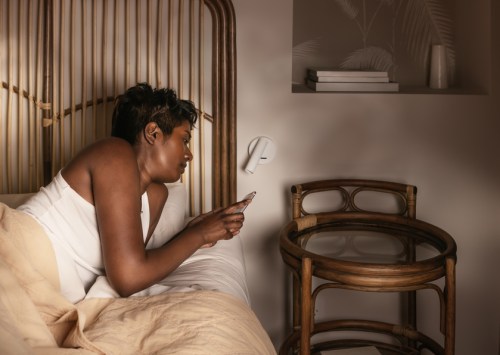One Common Impulse a Sleep Doctor Is Begging You To Avoid When You Can’t Fall Asleep
Clock-watching (or checking the time when you're struggling to sleep) can make it difficult to doze off, according to sleep specialists.

Seven to eight hours of sleep per night is one of those ideal metrics that’s earned a permanent spot in the daily wellness lexicon, right alongside 10,000 steps and eight glasses of water. But, just as with the latter examples, the equation for sleep is certainly not one-size-fits-all. And while there’s a ton of research to support the brain and body benefits of getting that much sleep on a nightly basis (and the detriments of falling short), focusing too much on the number can actually work against your ability to achieve it by triggering clock-watching behavior, or that nagging impulse to keep checking the time when you’re struggling to sleep. In fact, according to sleep specialists, that very action can place the sleep you so desire seemingly just out of reach.
Experts in This Article
scientist and the founder of Dr. Weiss Sleep Education
“Altogether, sleep quality tends to become worse in people who check the clock during the night,” says sleep-medicine specialist Carleara Weiss, PhD, sleep science advisor for Aeroflow Sleep. And that applies no matter how noble your intentions may be, whether you’re trying to calculate how much shut-eye you’ve managed to get or how much you can still fit in if you fall back asleep right then. “The science in behavioral sleep medicine indicates that the clock-monitoring habit may increase pre-sleep anxiety and worry during the night,” says Dr. Weiss.
Why clock-watching can stand in the way of a good night’s sleep
Given the strong ties between stress and sleep—with more stress leading to less sleep, which can prompt (you guessed it) even more stress—it’s easy to see how the anxious thoughts triggered by clock-watching can feed right into that cycle. Think about it this way: As you continue to check the clock while the night chugs along, the time becomes an increasingly brutal reminder of the fact that your hopes and dreams for an eight-hour night of sleep may be squashed. And the anxious thoughts that can emerge from there (Why can’t I ever get enough sleep? How will I function tomorrow with little or no sleep?) are just the stuff to bring on a sleepless night.
Not to mention, checking a clock at night tends to mean looking at the light of an alarm clock or the blue light of a phone, both of which may interfere with melatonin production and compromise sleep, too, Dr. Weiss adds.
“We’ve observed people who became overly attached to this habit and started waking up every night at the same time to check the clock.” —sleep specialist Carleara Weiss, PhD
Over time, clock-watching can also become such a pervasive habit as to chronically interfere with sleep, according to Dr. Weiss. “We’ve observed people who became overly attached to this habit and started waking up every night at the same time to check the clock,” she says. On the flip side, it’s also possible for clock-watching to emerge as a side effect to a larger, preexisting sleep issue, she adds: “Patients with obstructive sleep apnea or other health conditions affecting their sleep may also experience anxiety [over not getting enough sleep] and develop clock-monitoring behavior.” From there, the clock-watching may just serve to exacerbate the trouble they were already having with getting sufficient zzz’s.
In any case, constantly looking at the time when you’re trying to fall asleep is one of those habits you’d be best putting to rest, whether you’re managing chronic insomnia or a single night of restlessness. To remove the temptation, Dr. Weiss suggests covering the clock or phone, turning it toward a wall, or even taking it out of the bedroom (if you have another reliable way to wake up on time in the morning, that is).
From there, if you’re struggling to fall asleep, swap the clock-watching behavior with a relaxation technique—perhaps a guided sleep meditation, a 4-7-8 breathing exercise, or a thought-stopping practice to reverse the swirl of any anxious pre-sleep thoughts. “If you find yourself lying awake for more than a few minutes, you may also consider getting out of bed and practicing that relaxation technique on a chair,” says Dr. Weiss. (After all, staying in bed when you can’t sleep can actually condition the brain to view the bed as a place for insomnia rather than rest.) Just remember to keep the lights dim if you do get out of bed or move to another room, so as to keep your melatonin flowing and your body and brain in fall-asleep mode.
Oh hi! You look like someone who loves free workouts, discounts for cutting-edge wellness brands, and exclusive Well+Good content. Sign up for Well+, our online community of wellness insiders, and unlock your rewards instantly.










